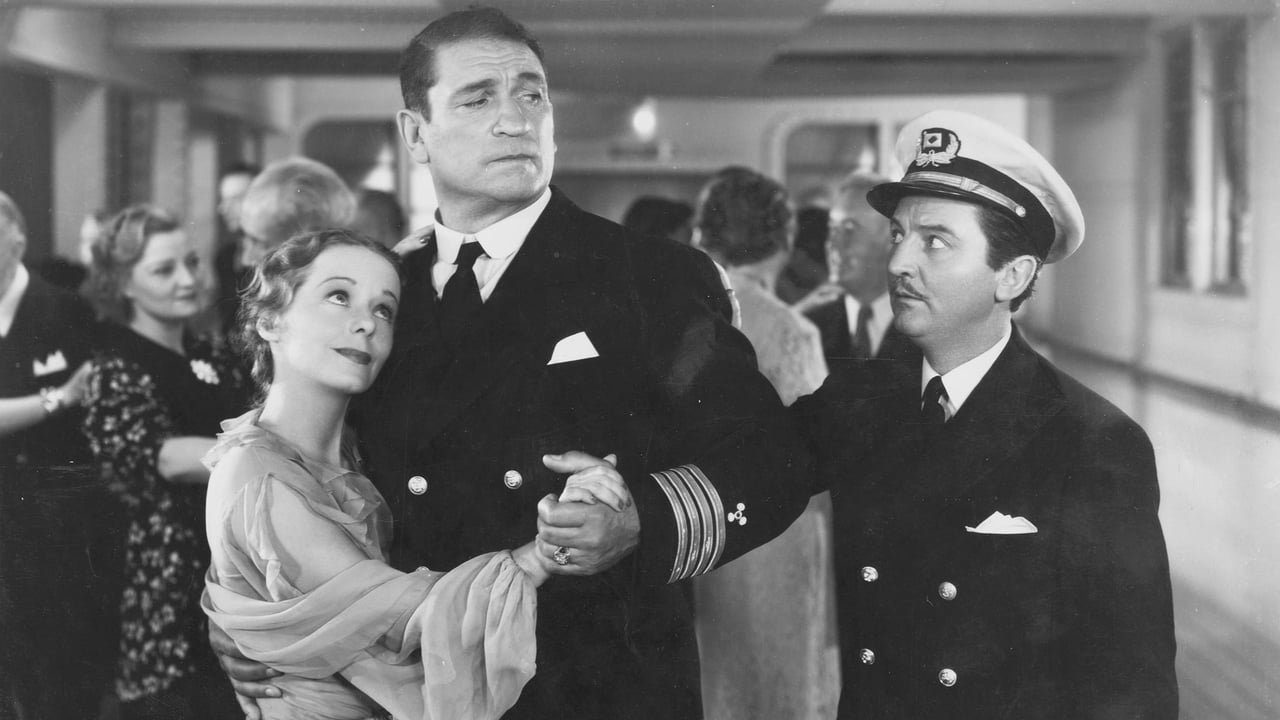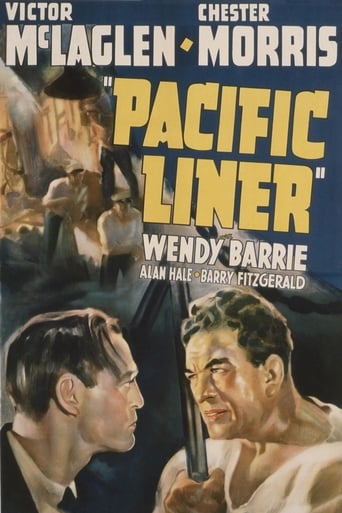Laikals
The greatest movie ever made..!
Boobirt
Stylish but barely mediocre overall
Nessieldwi
Very interesting film. Was caught on the premise when seeing the trailer but unsure as to what the outcome would be for the showing. As it turns out, it was a very good film.
Ortiz
Excellent and certainly provocative... If nothing else, the film is a real conversation starter.
ksf-2
With that bucket load of stars, it's a shame this one wasn't better. It WAS made five years after the Hayes code came whooshing in, so I wonder if it wouldn't have been a little more interesting if it had been made a couple years earlier... LOVE the scene where Alan Hale and another engine room worker are dancing together to the music coming from the upper decks. Alan Hale Sr. was the real life father of the Skipper on Gilligan's Island. He was the jolly, laughing character actor in about half the films made in the 1930/1940s. Viewers will recognize "Britches"...Barry Fitzgerald is the shorter Irish gentleman from The Quiet Man & Going My Way. Chester Morris (was sleuth "Boston Blackie") is the ship's doctor, who must deal with cholera outbreak. A stow-away has brought the deadly disease on board, and the captain (Halliwell Hobbes) must come up with a plan as it threatens to spread through the ship. Victor McLaglen is the burly, tough Chief Engineer, and had been a boxer in real life, which came in handy, since he needs to keep firm control of the men here. McLaglen would also work with Fitzgerald in "Quiet Man". Bombshell star of the 1940's Wendy Barrie is the ship's nurse. The film is OK, but it just kind of ends, without any drama or big climactic scene. Directed by Lew Landers. Worth watching on Turner Classics, but I sure wouldn't buy this one...
Michael_Elliott
Pacific Liner (1939) ** (out of 4) Disappointing RKO picture about a ship going from Shanghai to San Francisco and the crew coming down with cholera. The Captain (Victor McLaglen) tries to keep the men calm but soon they're threatening mutiny while the ship's doctor (Chester Morris) tries to find a way to keep the epidemic from spreading. Being a fan of McLaglen and especially Morris, I found this film to be pretty disappointing and it was made even worse when I noticed Landers was the man behind the camera as I usually enjoy his "B" pictures. What didn't work for me was the fact that the film seemed to forget what type of story it was trying to tell. The screenplay is all over the place as we're sometimes looking at the feud between the Captain and the doctor but then we'll jump to stories involving the crew members and then jump again to the outbreak on the ship. The movie just keeps jumping all over the place and at times I started to wonder if it had completely forgotten the stuff dealing with the outbreak, which seemed to be the main story for most of the running time. McLaglen gives his usual tough performance as he was born to play this type of role. Morris really doesn't get to do too much and I must admit that he left me a bit disappointed in terms of his performance. Not only is the character laid back too much but it seemed like Morris just wasn't all that interested in anything that was going on. The supporting cast includes Alan Hale, Barry Fitzgerald and Wendy Barrie. The film runs 76-minutes but it feels much longer due to the slow pacing and the lack of any real energy or thread of danger. Landers lackluster direction really doesn't help matters but I guess it's worth noting that RKO would use this ship again in Val Lewton's THE GHOST SHIP. It's also worth noting that the music score got an Oscar nomination even though you hardly hear it here.
sddavis63
A ship sailing from Shanghai, China to the United States is suddenly stricken with a cholera outbreak after the disease is brought aboard by a Chinese stowaway. That's the basis of the story here. It sounds as though a pretty good movie could be made out of that, as the cholera spreads throughout the ship and causes rising panic. Somehow, though, that was never really accomplished. Instead, from the very beginning, the disease was pretty well contained - kept in the boiler room where the stowaway was found. Yes, some of the boiler room crew died, but there was never any sense that the entire ship was at risk, the biggest issue seeming to be how much of a delay would be caused as the boiler room crew keep succumbing to the disease. On the side, there's a competition going on between the ship's doctor and the chief engineer for the attention of a beautiful nurse, and a lot attention paid to the relationship between the chief engineer and his men. All those things, though, seemed to keep distracting the movie from what should have been its real focus - the cholera outbreak. The only point at which there was any real drama - and when it looked for a moment as though this was really going to become a suspenseful movie - was the point when several of the boiler room crew started to mutiny and threatened to take the disease above decks, which would have put the passengers at risk. But that just fizzled out. The story overall was disjointed and disappointing.The problems with the story were somewhat (but not totally) compensated for by pretty good performances, especially from Chester Morris as the ship's doctor and Victor McLaglen as the chief engineer. Unfortunately, their talents could have been made better use of. 4/10
vandino1
Shanghai 1932. Chester Morris is pipe-smoking doctor who has signed on to the passenger ship the S.S. Arcturus. It's run above decks by the Captain played by Hobbes and below decks by Chief Engineer McLaglen (his character's name is "Crusher" McKay). Barrie is the nurse in love with Morris, but also pursued by big lug McLaglen. Then comes a cholera epidemic below decks. Cholera, of course, involves massive diarrhea, but here the actors just clutch their side and keel over. Eventually even McLaglen gets it. But of course Doctor Morris saves the day, gets the girl, and the ship makes it to port. But there is also an interesting, rather odd, sociological point of view to all this. The passengers are never told about the cholera, and the the above decks crew treat the below decks staff with contempt. Guilfoyle plays one of the "below deckers" who rails on about the despised "haves" living comfortably above. In fact, when the crew members die of cholera they aren't even given burial at sea, they're burned in the ship's furnaces! And at the end of the voyage the passengers leave complaining of the customer service with haughty contempt. This film certainly likes to stick it to anyone who doesn't shovel coal. But there is plenty of snappy dialogue and the inimitable over-sized presence of McLaglen to recommend it.

